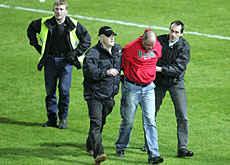Government hooligan plan is “overreaction”

The head of a Swiss organisation working with football fans has rejected new government proposals to tackle hooliganism in an interview with swissinfo.
David Zimmermann said the temporary measures for dealing with troublemakers were inappropriate and in part unworkable. They include a database of known hooligans and preventive detention.
The psychologist said that the government’s focus ahead of the 2008 European football championships should be on preventing trouble.
Other reactions have been more positive, with the Swiss Football Association’s Euro 2008 tournament director, Christian Mutschler, describing the proposals as “good and necessary”.
The umbrella group for work with fans, which was set up in May, works with young people to try to prevent outbreaks of violence at football and ice hockey matches.
Zimmermann believes the best way to tackle the problem of hooliganism is if the police and fan groups work side by side.
swissinfo: Are these temporary measures proposed by the government appropriate?
David Zimmermann: I think they are an overreaction. The problem in Switzerland, I think, isn’t so big that such measures are justified. The excuse is always that we will have the European Championships in Switzerland in 2008. But in my opinion we already have sufficient laws – good laws – to deal with [hooliganism] and prevent trouble during Euro 2008.
swissinfo: Is the government wrong to be so anxious about these championships?
D.Z.: Yes, I think so. If you look at our experiences from [the 2004 European championships in] Portugal, along with England, Germany and the Netherlands, we in Switzerland took measures to accompany our supporters. We had an information centre, a mobile fan embassy, where they could come and ask questions. I think if you really concentrate on welcoming fans from abroad you give them a good feeling and security, so they are less likely to cause trouble.
I think the police should follow the example of Portugal, where they had a motto “policing with a smile”. You could see policemen walking around, observing, showing their presence but they were not armed and didn’t provoke supporters. With that kind of police work you can avoid quite a lot of trouble.
swissinfo: Turning to the specific measures outlined by the government. What are the problems from your point of view?
D.Z.: For me the problem with the database [of known hooligans] is the concept of hooliganism, which covers many different things, including things that don’t really belong there, such as setting off flares in stadiums. My fear is that people doing this will be in this database afterwards and these measures would apply to people [as young as] age 15.
And the banning of known hooligans from certain zones would not solve any problems because if you decide on a zone and exclude elements you don’t like, so to speak, these elements go elsewhere. We’ve seen that in Switzerland and in other countries. In the beginning the trouble was always in the stadium and when measures were taken to avoid trouble there, they went to other places – stations for example.
swissinfo: So do you agree with any of the measures, or do you think they’re all unnecessary or even wrong?
D.Z.: They’re wrong and unnecessary. I think you should first pay more attention to prevention, because if prevention is done well you can avoid a lot of problems.
swissinfo: These measures still have to go to parliament. Do you think they’ll meet with much opposition?
D.Z.: I fear in parliament there’s no great opposition. The problem really is that we have the European championships coming up and everybody thinks we have a real problem with hooliganism in Switzerland, so it would be quite easy in my view for these measures to pass.
swissinfo-interview: Morven McLean
The measures are intended to remain in place until the end of the European championships in 2008.
They include a database of known hooligans, exclusion of troublemakers from stadiums and a maximum 24-hour detention period as the ultimate sanction.
Parliament has to agree to the measures before they can become law.

In compliance with the JTI standards
More: SWI swissinfo.ch certified by the Journalism Trust Initiative










You can find an overview of ongoing debates with our journalists here . Please join us!
If you want to start a conversation about a topic raised in this article or want to report factual errors, email us at english@swissinfo.ch.